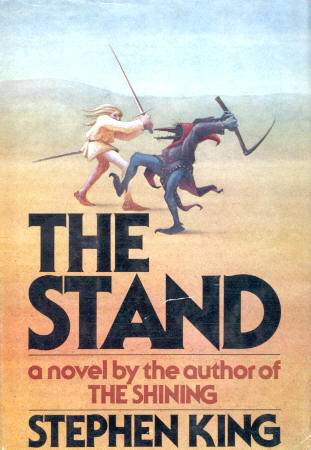You may have heard the rumor: Steven King’s The Stand is being made into a feature length film. This is a mistake. The Stand is not only Steven King’s worst book. It is one of the worst stories ever composed. It already exists as a 6-hour miniseries, and that’s torture enough.
Full disclosure: I’ve got to admit upfront that I think King is a hack. In general his stories are overwrought, self-aware, gratuitously gory triteness festivals of poor prose. He’s the Jackson Pollock of fiction (If you don’t recall, Pollock was famous and popular, partly, for shitting paint onto a canvas. Not figuratively.)
The Stand breaks almost all conventions of modern narrative, and not in the “I’m an experimental genius” kind-of way, rather in the “No one ever taught me how to write narrative fiction” kind-of way.

For example, the characters are overly stereotyped (okay sometimes for short fiction, but never okay in an epic-length novel.
The plotline contains too little escalation and almost no foreshadowing, and commits one of the most egregious of literary errors: a passive climax.
I frequently refer my student to this story, as a great example of how not to construct a narrative plot. In the next paragraph, I’m going to summarize the plot, so if you haven’t seen it yet, keep reading, it will save you a lot of grief.
In this story, the world nearly ends. Almost everyone on the planet has been lost, with the exception of a scattered handful of people in North America who all have a mysterious compulsion to meet in one specific point in the deserts of Arizona.
The story follows several small groups as they coalesce and travel together. It soon becomes obvious that all of the people left fall either to a good or bad side, and as the groups of good and bad people meet, there are episodes of suspicion, drama, and violence.
Eventually, the good and bad each form armies of sorts, and rise to meet one another for a ragnarokesque battle in the desert, a conflict to decide the war between good and evil once and for all.
Just as the groups are about to meet, however, the hand of God, reaches from the clouds above, not unlike the Monty Python foot, and kills all of the bad people. That’s it. That’s how it ends.
I was upset when I read the story, but thought that maybe I had interpreted it incorrectly. Perhaps he didn’t literally mean that the hand of God resolved the conflict. Maybe I was missing something, so I gave it the benefit of the doubt and watched the mini-series when it came out.
At the end, a giant, blue, well-manicured, man’s hand descends from the sky and kills all the evil people, just as I had pictured originally. It was six hours I would never get back.
Why? Oh, why would anyone turn this travesty into a film? Unless that ending is drastically rewritten, which it won’t be, since King is wealthy and popular enough to demand that he be given a lead role in making any movie based on his works (most authors would be laughed at for such demands), it will be the worst movie of the year, maybe the decade (I would say century, but well… Gigli).
I’m not going to fall for it again. No benefit of the doubt this time. I’m going to skip it. The Dark Tower movie on the other hand, I might give a chance, but I’ll be going into it expecting terribleness.






